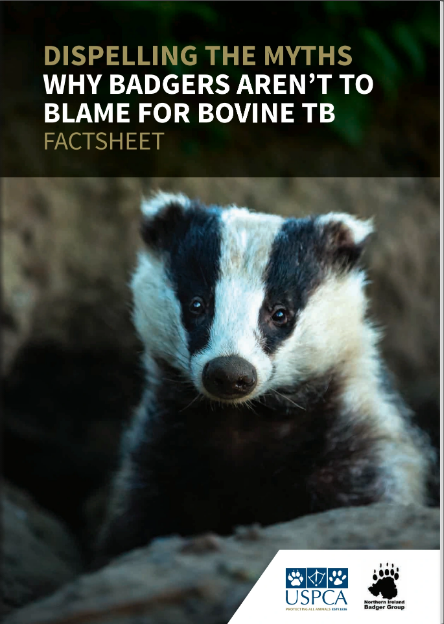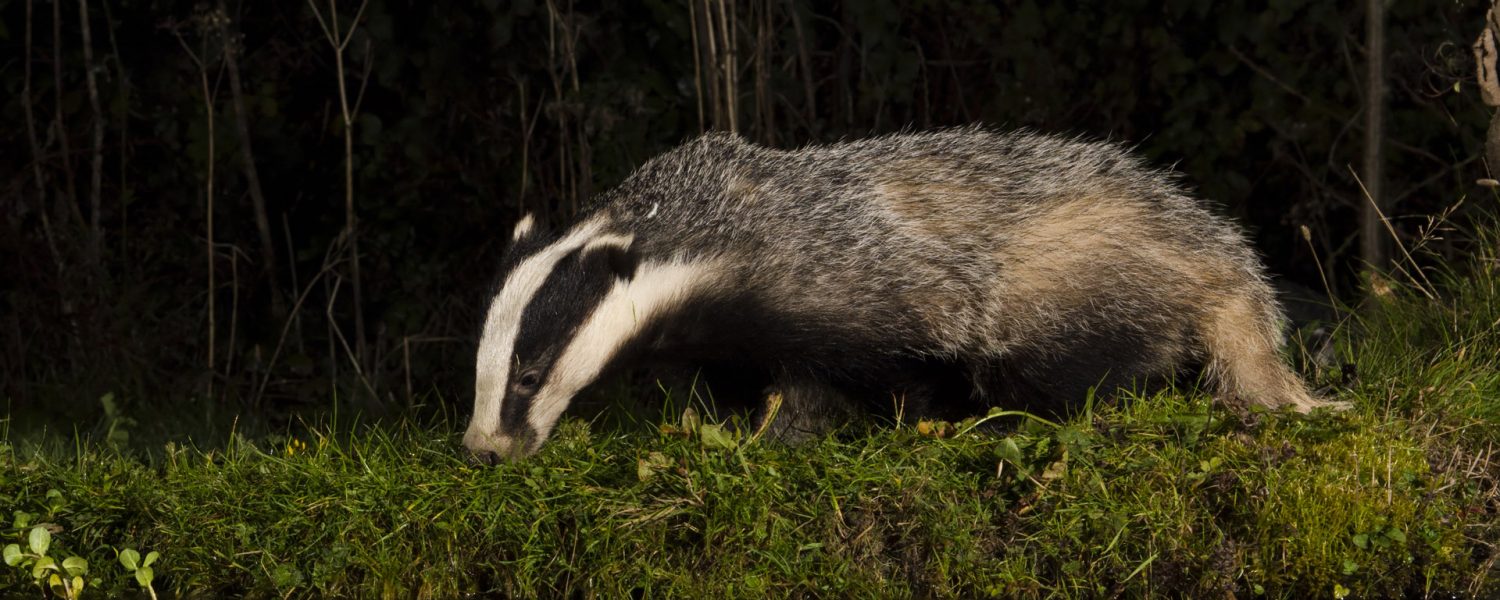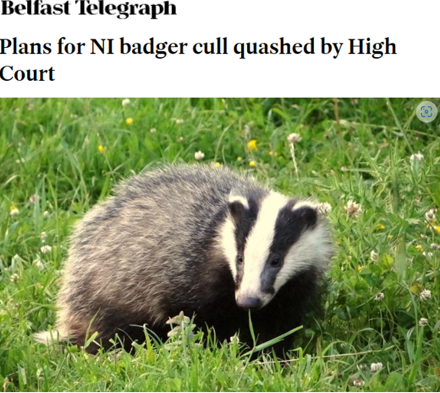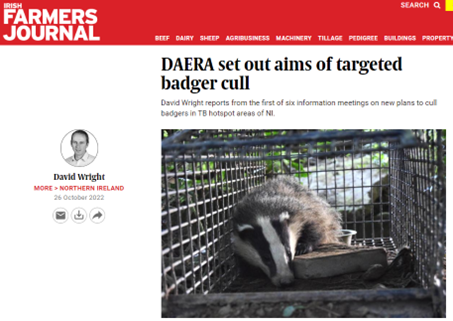With the use of the farming industry press, the farming sector is being hoodwinked into thinking that badger culling could somehow help them. Or is badger culling perhaps, as in England, being used as a delaying tactic and distraction from real epidemiological solutions that would prevent both disease and help end dependence on constant public subsidy?
In 2021, the Northern Ireland Department of Agriculture, Environment and Rural Affairs (DAERA) announced proposals to copy English-style badger culling in Northern Ireland. As a result, a legal challenge to this will take place on Monday 21 November next week, with a one-day judicial hearing by the Department of Justice at the Royal Courts of Justice in Belfast.
It will be the most important day for NI badgers for decades, although the outcome may take months to be announced. The hearing is open to the public to observe in person, and it is listed to start at 10.00 am.
Year-on-year failure
It is barely possible to believe, after year-on-year failure in England and the Republic of Ireland, that DAERA wish to draw a veil over their inadequate cattle controls and cull around 10,000 badgers over the next 10 years across Northern Ireland. With an estimated 2,400-3,200 badger adults and cubs to be killed within the first four-year period, and then supplementary culling for perhaps a further 5 or more years, adopting the unsuccessful 70-96% kill technique attempted in England.
Also proposed is an element of experimental badger vaccination after the mass slaughter, a policy that government appointed experts in England say is an unproven approach to the control bTB in cattle. The ongoing badger culls in England and the Republic of Ireland (RoI) suggest that the DAERA estimates and timescales could prove to be over-optimistic. Twenty years on, the RoI is still culling badgers and still failing to eradicate bTB from its national herd. It hasn’t worked, and since the free movement of diseased cattle continues, it is not a surprise.
The NI legal challenge made earlier this year by Wild Justice and NI Badger Group, is that the consultation by DAERA on options to control the badger population to tackle bovine tuberculosis (bTB) did not meet the requirements for a lawful consultation. The DAERA consultation referenced a ‘business case’ for the cull but failed to make the document available for scrutiny, and for some mysterious reason it has been withheld. Perhaps that is because it doesn’t stack up and is little more than guesswork?
Therefore, the resulting decision to choose to greatly diminish the badger population by allowing farmer-led groups to shoot at free-roaming badgers at night is also, it is argued, unlawful. On 9th September, a presiding judge at Belfast’s High Court, The Honourable Mr Justice Scoffield, agreed that the challenges were arguable and hence the hearing date was set.
Wild Justice, with others, also argue that DAERA Minister Edwin Poots’ decision, announced in March 2022, to allow farmer-led companies to shoot an average of 1,000 badgers a year, is unlawful because he issued the Article 13 (power to destroy wildlife) order under the Diseases of Animals (Northern Ireland) 1981 Order. Controversial climate-change denier Poots, did this without making sure that there is no reasonably practicable alternative way of dealing with bovine TB across Northern Ireland. In September, Mr Justice Scoffield ‘stayed’ a decision on this challenge for consideration later, perhaps when the first two grounds are decided.
Competence of veterinary bodies and advisors
As in England, the competence of veterinary bodies and advisors within government is under close scrutiny, with advice from the ‘cattle vet’ contingent on maintaining intensive beef and dairy production being called into question. They disregard the fact that bTB is changing at similar rates in Wales and England, with Wales not culling badgers.
Now DAERA are busy promoting badger culling with ‘roadshows’ which make exaggerated claims, disseminate misinformation and use other propaganda tricks to force their proposed wishes on the public. See for example:
https://www.farmersjournal.ie/daera-set-out-aims-of-targeted-badger-cull-730904
https://www.farminglife.com/business/farmer-levy-to-fund-btb-badger-cull-3897714
https://www.impartialreporter.com/news/23083437.fermanagh-farmers-hear-tb-eradication-measures-begin-2023/
TB Eradication Partnership (TBEP) Chair Sean Hogan promoting badger shooting on BBC Radio Ulster (from 21.20):
https://www.bbc.co.uk/programmes/m001d4rx
There is evidence that all the bully-boy tactics used in England will be used in NI. At a recent roadshow in Armagh, farmers were apparently told that DAERA would, if necessary, invoke the Diseases of Animals Order to cull badgers on lands where the owner refuses permission.
If the JR case is won, DAERA’s credibility would be seriously damaged and the policy would be required to go back out to consultation, perhaps even without an Assembly. An Assembly could reconvene before fresh elections are announced. But a fresh decision on the outcome would probably need Ministerial authorisation if significant changes were made to the proposals.
The assessment of ecological-impacts question also remains unaddressed
This case may also remind DAERA of another ‘ticking time bomb’ within its proposals only to carry out ‘preliminary ecological assessment’ to form a baseline to monitor badger culling impacts on designated sites and species. Proposals are completely insufficient and don’t even reach the almost non-existent care taken by Natural England in England. Legal challenges in England since 2017 imply that any NI action licensing the culls would be subject to JR, due to inadequate assessment and monitoring of culling impacts in the way described within the various English High Court legal proceedings. Failure to form an adequate baseline and credible monitoring methods could bring any badger cull decision to a grinding halt even if a go ahead was given.
“Insanity is doing the same thing over and over and expecting different results.”
DAERA has created an almighty mess in trying to copy the failed English culls and is heading for a fall. We can only hope that justice is done and this cruel, unscientific and useless killing of protected wild mammals is confined to the history books marked ‘fail’, where it belongs.





